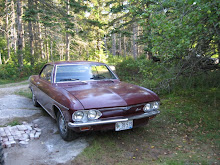For months now I've been bedeviled by an odd leak in the Corvair's [single cylinder] braking system.
When driving the car, the brakes - which have received a lot of attention in the 5 years I've owned the car - had worked well. However, when the car sat at the ferry terminal for weeks at a a time, the brake fluid level at the master cylinder would be down, as if fluid had leaked out during the hiatus.
For a long time I just kept filling the reservoir and topped it up any time I used the car. Then I realized that the only place the brake system had residual pressure was at the master cylinder itself. The gnarly black carpet under the pedal would not show any leakage there [sometimes the fluid runs down the pedal], but the occasionally soft pedal under pressure did hint of an internal leak within the cylinder.
The old cylinder didn't look that pretty anyway.
Clearly there had been some moisture in the fluid; the inside looked rusty.
The Corvair's master cylinder rests on two studs that protrude from the firewall; you just unbolt the cylinder and remove the short brake pipe from the bottom of the cylinder.
Since the new cylinder came with its own bench bleed screw I figured this was a job I could do myself - but with the car on the mainland I needed to find a place to do the job. I called Jim Westervelt, who has his own lift in his garage, and knows Corvairs intimately, but medical problems had laid him up. A Land Rover buddy who works at East Coast Rover would not be there on my appointed day, so I contacted a shop in Warren, ME, and asked them to do the job for me.
The old one came out quickly but Copeland's said the new one leaked fluid when they tried to bench bleed the cylinder [bench bleeding removes air from the cylinder, reducing the amount of bleeding later]. A call to Clark's Corvair revealed that the master cylinder rod travel in the car would be much less then our hearty thrusts to purge air from the cylinder. Push lightly and for a short travel only, and all would be fine - and it was.
Copeland's broke a wheel cylinder bleed screw while bleeding the system, but within an hour, I had a new master cylinder and very good brakes. With new wheel cylinders and some new rubber lines, the system should be tight and safe now.
Old systems like the Corvairs had only one brake circuit, so if it failed, you had no brakes. All cars post-1968 have dual [now 4 in some cars] circuits so you'll always have some brakes.
Needless to say the car was an even greater joy to drive. As a bonus, Copeland's took a few moments to track back a brake light problem I've been having; it seems that I have a problem in the wiring to my directionals which also affects the brake lights. I have one for now, at least, and with luck, the second lamp will activate once I check out the directionals under the steering wheel.
Sunday, March 18, 2012
Subscribe to:
Comments (Atom)









